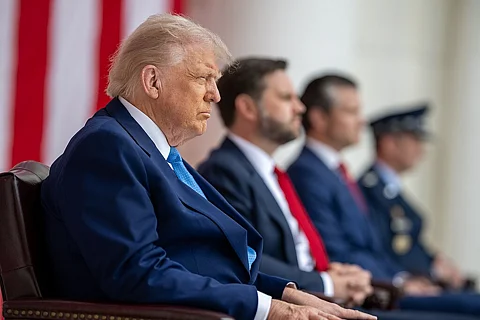

A federal trade court on Wednesday ruled that President Donald Trump overstepped his authority by imposing broad tariffs under an emergency-powers law, marking a significant setback for his aggressive trade agenda.
The three-judge panel at the U.S. Court of International Trade in New York found that Trump’s tariffs—enacted under the 1977 International Emergency Economic Powers Act (IEEPA)—exceeded presidential authority. The decision came in response to multiple lawsuits alleging that Trump’s policies destabilized U.S. trade relations and bypassed congressional oversight.
In its ruling, the court stated that the IEEPA does not grant the president the power to regulate imports through tariffs. “The Worldwide and Retaliatory Tariff Orders exceed any authority granted to the President,” the judges wrote. They emphasized that their decision was not a judgment on the effectiveness of tariffs as a policy tool but rather a legal determination that the administration lacked statutory authority.
The Trump administration swiftly filed a notice of appeal, with White House officials criticizing the ruling. “It is not for unelected judges to decide how to properly address a national emergency,” said White House spokesperson Kush Desai.
Financial markets, however, reacted positively. The U.S. dollar strengthened against major currencies, including the euro and yen, while Wall Street futures and Asian equities rose.
If upheld, the ruling would undermine a cornerstone of Trump’s economic policy, which relied on steep tariffs to pressure trading partners, revive U.S. manufacturing, and reduce the nation’s $1.2 trillion trade deficit. Without the immediate leverage provided by IEEPA—which allows tariffs of 10% to 54% during national emergencies—the administration would need to pursue slower trade investigations under other laws to justify future tariffs.
The case is expected to advance to the U.S. Court of Appeals for the Federal Circuit and potentially the Supreme Court. At least seven lawsuits challenge Trump’s tariffs, with plaintiffs arguing that trade deficits—a persistent issue for 49 years—do not constitute an “unusual and extraordinary threat” justifying emergency action.
The lawsuits were brought by small businesses, including wine importer VOS Selections, as well as a coalition of states led by Oregon. “This ruling reaffirms that our laws matter, and that trade decisions can’t be made on the president’s whim,” said Oregon Attorney General Dan Rayfield.
Trump’s tariffs, which at one point targeted most of the world’s economies, sparked market volatility and drew criticism from economists who warned of dampened growth. Despite the White House’s insistence that the measures were necessary to protect national security, the court’s decision casts doubt on their legal foundation.
The ruling leaves intact tariffs imposed under Section 232 of the Trade Expansion Act of 1962, which allows duties for national security reasons. However, the broader question of presidential authority over trade policy now hangs in the balance as the legal battle continues.